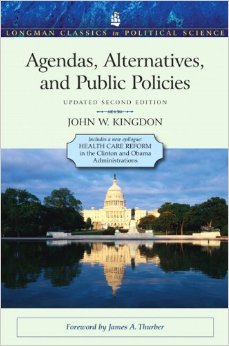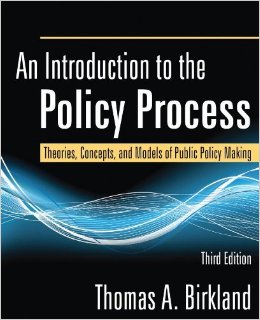Course Information
- Political Science 405
- Tuesdays and Thursdays 9:30AM-10:45AM at Sierra Hall 270
- Moodle will also be used as the course learning management system (http://moodle.csun.edu)
Course Description
The goal of this course is to introduce you to the process of policy formation within our fragmented system of government. Public policy is government's way of correcting both private and public decision-making. In this sense public policy formation, implementation and evaluation is part of a collective decision-making process in order to solve societal problems.
The course format will be as follows: First, we will learn what an actual public policy is and why it is necessary to have public policies. Then, we will learn the models and theories of policy-making. Finally, we will go through each of the stages/processes of policy formation. Although the course focus is on policy formation, it is also essential to understand the later stages of implementation and evaluation. The way a policy is actually implemented will indeed have an effect on the policy, itself, thus changing the original intent or design. Therefore policy change or reformulation and termination are the concluding sections of the course. We will learn the complexity of policy formation. The outcomes of policies are unpredictable and in most cases policies are not designed to solve the actual problems in society. This is the result of the eternal marriage between politics and policy.
What we are going to learn:
- How, when and why policies are made;
- What factors play a role in policy decisions;
- Who are the actors in policy formation and the policy process;
- How political depiction and social construction play a role in policy formation;
- How policy formation effects policy implementation and how implementation effects the actual policy;
- Finally, how policy evaluation leads to policy reformulation and change
Student Learning Objectives
Critical Thinking – Students should demonstrate increasingly sophisticated skills in reading primary sources critically. Students should be able to research and evaluate the models, methods, and analyses of others in the field of Political Science, and critically integrate and evaluate others’ work.
Political Decision Making – Students should demonstrate an in‐depth understanding and knowledge of the political institutions through which public policies are formulated, modified, and implemented.
Course Requirements & Grading
Paper Assignment:
For the final paper you will apply John Kingdon's Multiple Streams theory to your policy area of choice. Kingdon's theory is a good theory for policy formulation and agenda setting. By applying this theory you will learn how the policy problem was defined, what kind of policy solution was created and what role politics played in the formation of public policy.
Here are some areas you may consider for your paper: prescription drugs, social security, housing, disability, abortion, drug abuse, steroids, crime, foster care, etc. You may not select a topic that will be discussed in class such as welfare, environment, health, and food. If you wish to focus your research in the latter areas, please speak to me and we can figure out a specific area within the larger policy domain or sub-domain for you.
Paper Proposal
A 1-2 page proposal for the final paper that outlines and describes your research area will be due in class on September 4. The purpose of the proposal is to help prepare and guide you in your research. Once submitted, I will review each student’s topic and make sure you are on the right track before investing time and effort on the final research paper. This means I will review and approve each of the research topics and have them ready for you in class the following week.
The proposal should include the following information:
1. What policy area have you selected
2. Why have you chosen the specific area
3. Provide a very brief background and introduction to the policy area
4. Finally, explain the methods you will use for your final paper such as the kinds of research you will conduct whether it will be library research, interviews, site visits, etc.
Initial Draft of Paper
The initial paper draft is due in class on October 16. The draft should include your research on the policy of your choice, which was approved after your paper proposal.You will have an opportunity to read over my comments and make revisions for your final paper.
1. You have fully explained your policy.
2. You have identified the actors/players and their interests both within and outside government.
3. How does each view the problem and the policy solution based on their beliefs and values?
4. What kind of indicators, persuasion or evidence did the players use to push their positions?
Final Paper
The final paper should be 8-10 pages excluding the reference section. Please use 12-point font with the appropriate margins. A good way to make sure you do not miss any of the requirements listed below is to use sub-titles to guide you through the paper. It will be due on December 16.
What is expected in the paper?
1. You are able to conceptualize and specifically identify public policy issues discussed in class and the readings.
2. You have identified the actors/players and their interests both within and outside government. How does each view the problem and the policy solution based on their beliefs and values?What kind of indicators, persuasion or evidence did the players use to push their positions?
3. You are able to accurately apply and meaningfully discuss Kingdon's theory
a. How did the issue progress to the policymakers' agenda? In other words, how did the problem become a public problem needing immediate attention?
b. How was the problem defined?
What was the policy solution?
What was occurring in the political stream?
4. Finally, whether you think the policy created actually addressed the problem.
APA Style
Please utilize the APA style guide for your final paper. You may refer to the APA manual for formatting and citation requirements. Purdue University’s Online Writing Lab is a good source for general APA guidelines and can be found at http://owl.english.purdue.edu/owl/resource/560/01. In addition, two useful Web-based tools that may be used to help generate citations include:
1. Son of Citation Machine - http://citationmachine.net/index2.php
2. The KniteCite Citation Service - http://www.calvin.edu/library/knightcite/index.ph
Exams
You will have three exams in the class. The exams will be based on the reading and class lectures. Each exam will be a combination of true/false, multiple choice, fill-in the blank, as well as short essay questions.
Attendance
I will randomly take role and call out a few student names. If you are not present when your name is called, then you will loose attendance points. Students are expected to prepared to discuss the case studies within the Birkland textbook.
The grading will be broken down as follows
| Exam 1 | 15 |
| Exam 2 | 15 |
| Exam 3 | 15 |
| Paper Proposal | 5 |
| Initial Draft of Paper | 12 |
| Final Paper | 20 |
| Presentation | 10 |
| Attendance | 8 |
*There will be no extra credit or make-up work available in the course. Make sure to mark your personal calendars in advance since the due dates are not negotiable.
Percentage |
Grade |
95-100 |
A |
90-94 |
A- |
87-89 |
B+ |
83-86 |
B |
80-82 |
B- |
77-79 |
C+ |
73-76 |
C |
70-72 |
C- |
67-69 |
D+ |
63-66 |
D |
60-62 |
D- |
0-59 |
F |
Course Schedule
Dates |
Reading, Exams, and Papers |
| T-8/26 | Syllabus and introduction Moodle: |
|
T-09/02 |
Birkland: |
TH-9/04
|
Paper Proposal Birkland: Ch. 5 – “Unofficial Actors and Their Roles in Public Policy” Kingdon: |
T-09/09 |
Moodle: |
|
TH-09/11 |
Moodle: |
T-09/16 |
Exam 1
|
TH-09/18 |
Documentary, “An Inconvenient Truth” (in class) Birkland: Moodle: |
|
T-09/23 |
Kingdon: Moodle: |
TH-09/25 |
Kingdon: |
TH-10/09 |
Exam 2 |
T-10/14 |
Birkland: Moodle: |
TH-10/16 |
Initial Draft of Paper Birkland: Moodle: |
T-10/21 |
Documentary, “Berkley in the 60s” Birkland: Moodle: |
T-11/04 |
Exam 3 |
TH-11/06 |
Moodle: *Campus closed for Veteran’s Day on 11/11 |
TH-11/20 |
Student presentations
*Campus closed for Thanksgiving on 11/27 |
T-12/16 |
Final Paper |
If you are interested in printing the syllabus, you may access the PDF here.
At any time this syllabus may be amended or revised. Students will be notified if any changes are made.


